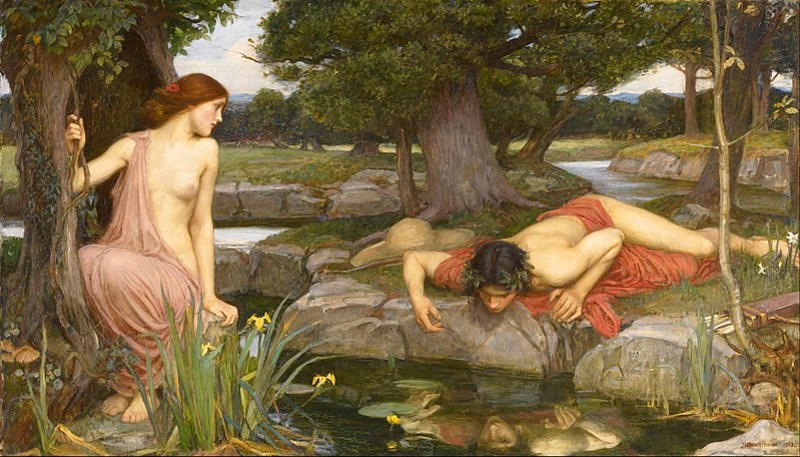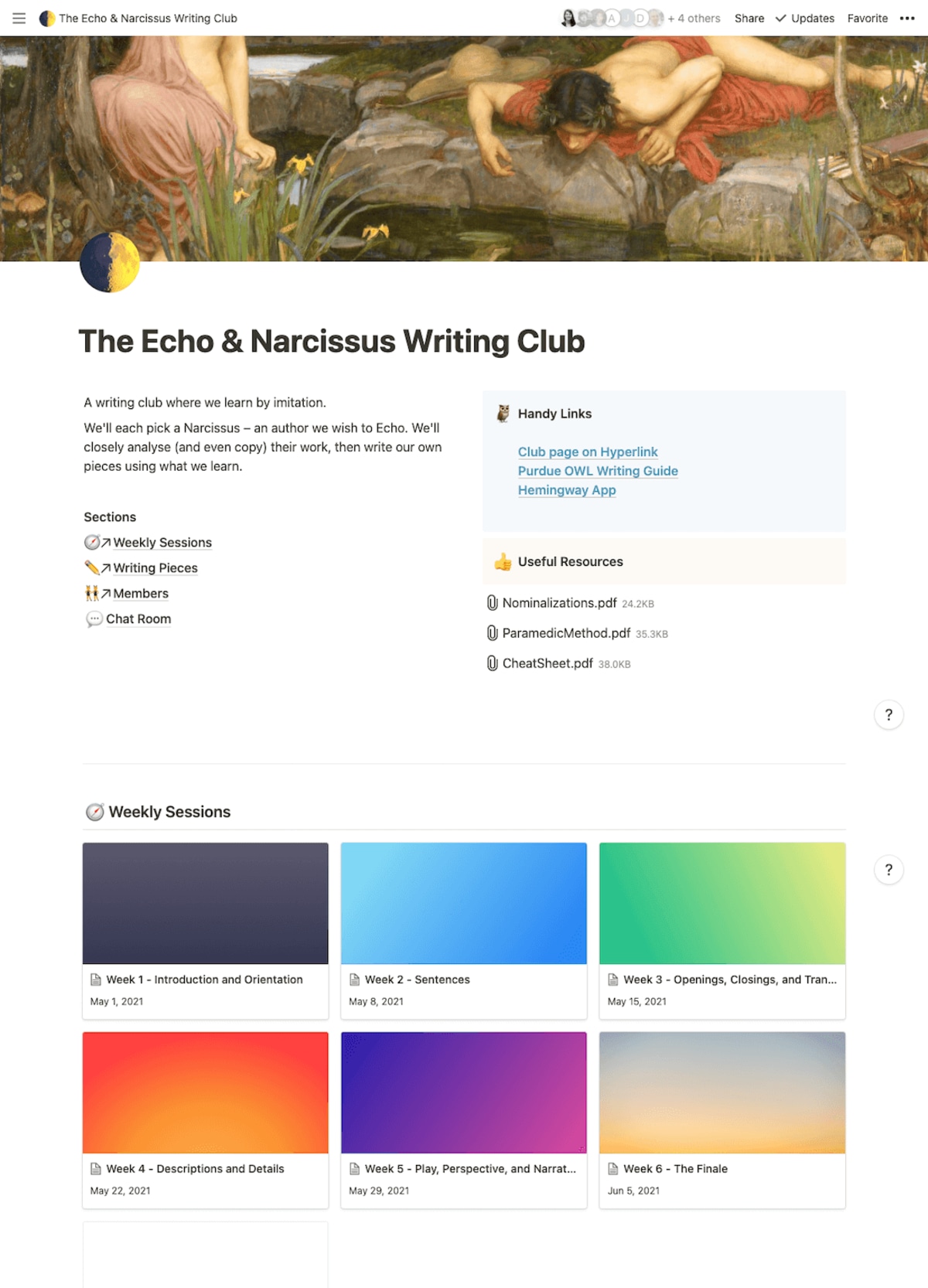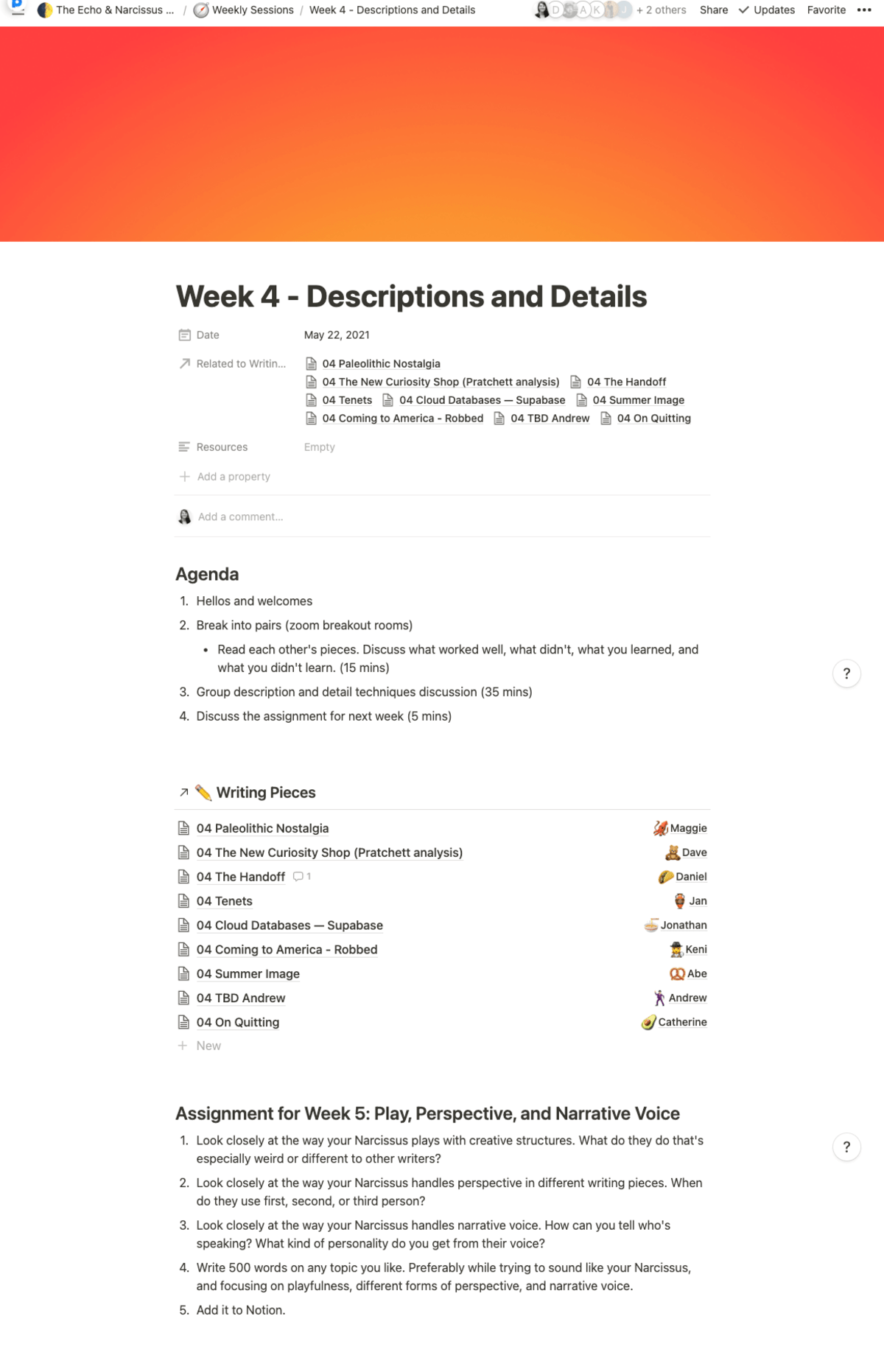The Echo & Narcissus Writing Club
Evergreen
🌳Planted Apr 09, 2021 –
Last tended Jun 08, 2021
Collaborative Learning
In the story of Echo and Narcissus, a chatty mountain nymph and a self-obsessed hunter both die from unhealthy obsessions. Echo won't shut up, annoys the wrong goddess, and ends up cursed to repeat the words of others; she's unable to say anything original. She then falls in love with Narcissus, a pretty boy who spends his whole day staring at his reflection and is wholly unimpressed with the woman repeating everything he says. In the end, they both spend so much time staring at Narcissus they forget to eat, bathe, or sleep and slowly waste away.

This delightful story is a good reminder to eat regular snacks. It's also a fitting metaphor for one of the clubs I run at
The
This might sound scandalous depending on your understanding of creativity. I'm personally a subscriber to the
I used to think copying was unseemly before one of my writing professors in college filled me in on the big, unkept secret. He handed us a small trove of writing samples from folks like
You would take a Didion sentence like 'Only the very young and the very old may recount their dreams at breakfast, dwell upon self, interrupt with memories of beach picnics and favorite Liberty lawn dresses and the rainbow trout in a creek near Colorado Springs,' and learn how to see it as "Only the ____ and the ____ may ____, ____, ____ and ____." A reusable format for pointing out similarities between two distinct things.
The point is not to rip off Didion, but to begin to see how she uses nouns. Where she places verbs. How she handles semi-colons. Where she begins a story and where she ends it. How she asks a question. How she makes you doubt her credibility as a narrator.
Copying forces you to look at writing techniques under a microscope. You stop seeing your favourite authors as magical beings who pump out great work from behind a veil. Everything you need to know about their process and how to write like them is already on the page in front of you.
Great writers become great by closely studying and copying other great writers. This is how cultural knowledge works. We learn the foundational skills from each other first, and then get all weird and experimental later on once the normal rules become boring.
Who This is For and What to Expect
If you have a writing practice of any kind, and feel the urge to improve it, this club is for you. You will need to bring along a Narcissus - a writer whose work you love and want to emulate. If you are bad at making choices, you can bring along two.
We keep it casual - the weekly meetings are to chat, compare what we've learned, and give each other feedback in pairs. There won't be lectures or lots of instruction. As a peer learning group, it's simply a way to gather together and support each other on our journey to being less-crap-writers.
It will require a commitment to write. The writing doesn't have to be good or profound or SEO-optimised. It simply needs to try and copy the style of your Narcissus. We'll write 500 word pieces for the first 4 weeks, and 1000+ words in the final week.
It runs for 6 weeks and costs 35 USD. I find a little skin in the game helps everyone show up on time. Committed folks make the experience better for everyone.
Cohort 1
The first cohort of this club ran from May 1st to June 6th 2021.
We ended up with a wonderfully committed and insightful group of folks – something you don't always bank on with online learning groups.
Everyone came in with an active writing practice which I think made a significant difference. They already made time to write; publishing to personal blogs, newsletters, or ongoing fiction collections. The club simply directed that writing effort toward certain themes and assignments.
Our Echos and Narcissus Pairs
And I echoed Ursula K. LeGuin / Joan Didion
Club Logistics
I wanted to run the club in a space where we could take open-ended notes, write individual essays, and leave comments on each other's work. I ended up using

We all posted our weekly writing to a central database in here. I then used Notion's fancy
Here's an example of what each weekly agenda looked like:

Notion worked great for this round. For future cohorts I might try running it on the new platform Hyperlink is building (aptly named Hyperspace) which is based around wiki-like shared documents.
If you're interested in joining a future cohort, you can sign up to be notified on the